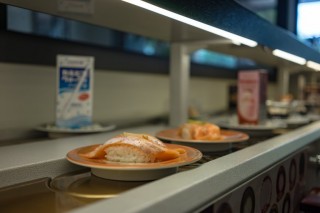Loading
Search
▼ Japanese Revolving Sushi Restaurant Chain Stops Revolving During Coronavirus Outbreak
- Category:Other
But customers wonder if it will do anything to help the growing health crisis.
As cases of the novel coronavirus dubbed COVID-19 by the World Health Organisation continue to rise in Japan, businesses around the country are amping up countermeasures to help contain the outbreak.
Following news that major tourist sites like the Ghibli Museum and Tokyo Disneyland have closed their doors temporarily comes the announcement that Hamazushi, one of the country’s biggest kaitenzushi conveyor belt sushi chain restaurants, will now put the brakes on their revolving belts.
A spokesperson from the company said Hamazushi will no longer be serving items on their conveyor belts, instead asking customers to place orders using the touch panel displays installed at each table instead.
The company says the decision to stop running the conveyor belts was made in order to protect their customers and provide them with peace of mind during the growing coronavirus outbreak.
The temporary halt on the conveyor-belt delivery system was put in place at all 513 Hamazushi branches in Japan on 3 March, with no fixed date given for when they will resume operating.
The decision was applauded by many online, however others weren’t so sure how effective the new measures would be in preventing the spread of the virus.
“Doesn’t the virus survive for a relatively long time on surfaces like touch screens?”
“I’ve seen those touch panel displays covered in fingerprints at kaitenzushi joints.”
“I hope staff wipe the panels with disinfectant after customers use them.”
“I’ve stopped going to conveyor belt sushi restaurants because I’m terrified of customers sneezing or coughing on the dishes.”
“The conveyor belts should just have dishes with plastic samples going around on them.”
It’s not easy for businesses to allay customer fears in the midst of the growing health crisis, but it’s heartening to see them putting new measures in place and thinking outside of the box, or in this case, outside of the lane, to help put people’s minds at ease.
And with the Ninja Castle in Asakusa and the Heart of Hearts maid cafe in Akihabara adopting new methods to alleviate customer’s concerns, here’s hoping we see more of these calm, measured approaches to safeguarding the public and less of the panic-buying and panic-stealing that’s sadly going on right now.
As cases of the novel coronavirus dubbed COVID-19 by the World Health Organisation continue to rise in Japan, businesses around the country are amping up countermeasures to help contain the outbreak.
Following news that major tourist sites like the Ghibli Museum and Tokyo Disneyland have closed their doors temporarily comes the announcement that Hamazushi, one of the country’s biggest kaitenzushi conveyor belt sushi chain restaurants, will now put the brakes on their revolving belts.
A spokesperson from the company said Hamazushi will no longer be serving items on their conveyor belts, instead asking customers to place orders using the touch panel displays installed at each table instead.
The company says the decision to stop running the conveyor belts was made in order to protect their customers and provide them with peace of mind during the growing coronavirus outbreak.
The temporary halt on the conveyor-belt delivery system was put in place at all 513 Hamazushi branches in Japan on 3 March, with no fixed date given for when they will resume operating.
The decision was applauded by many online, however others weren’t so sure how effective the new measures would be in preventing the spread of the virus.
“Doesn’t the virus survive for a relatively long time on surfaces like touch screens?”
“I’ve seen those touch panel displays covered in fingerprints at kaitenzushi joints.”
“I hope staff wipe the panels with disinfectant after customers use them.”
“I’ve stopped going to conveyor belt sushi restaurants because I’m terrified of customers sneezing or coughing on the dishes.”
“The conveyor belts should just have dishes with plastic samples going around on them.”
It’s not easy for businesses to allay customer fears in the midst of the growing health crisis, but it’s heartening to see them putting new measures in place and thinking outside of the box, or in this case, outside of the lane, to help put people’s minds at ease.
And with the Ninja Castle in Asakusa and the Heart of Hearts maid cafe in Akihabara adopting new methods to alleviate customer’s concerns, here’s hoping we see more of these calm, measured approaches to safeguarding the public and less of the panic-buying and panic-stealing that’s sadly going on right now.
- March 6, 2020
- Comment (0)
- Trackback(0)


